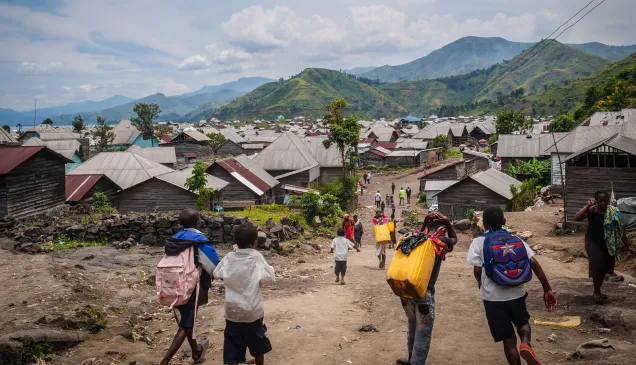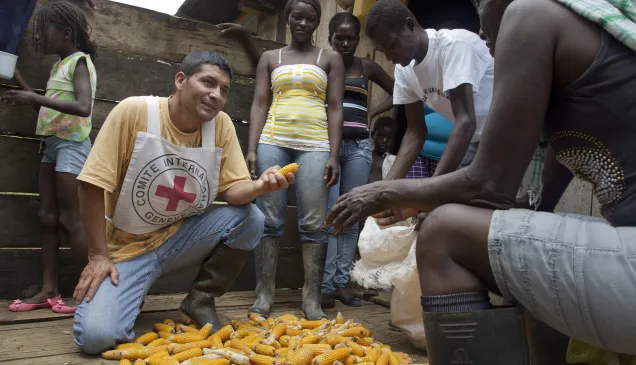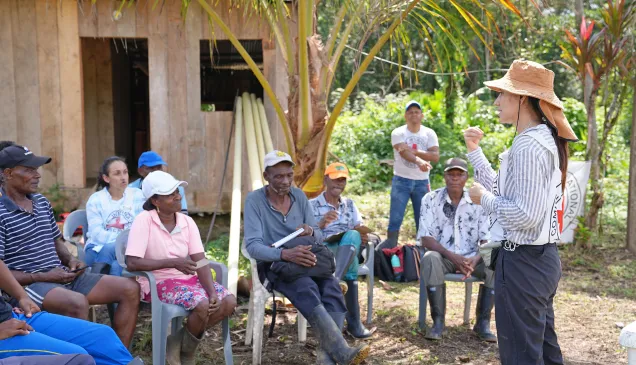Nigeria: Changing lives one brick at a time
The Buni Yadi shelter project
The grim reality of homecoming
Hope comes in many forms. For the people of Buni Yadi, hope came in the shape of houses. Houses that replaced the ones they had lost at the height of the armed conflict in Yobe, one of the most affected states in the North East.
In 2014, many residents fled for their lives in the aftermath of cyclic attacks that destroyed their homes and livelihood. Over 75% of houses were destroyed in the process and the entire population displaced.
"It was a very difficult time," said Lawal Musa, Buni Yadi's district head. "Everyone fled to different parts of the country for safety. We managed to get out and make it to Damaturu, while others fled to Gombe. Our community was a ghost town for nearly three years."
Almost three years later, the villagers began to trickle in back to the community. It was a ghost town, which meant that they came back to razed down houses, no water and no food. A bleak situation that was all the more worse in light of the fact that it would obviously take a while for them to rebuild their homes and lives. The memory of returning for the residents of Buni Yadi was one filled with pain and trepidation.
"Home was not a good sight to behold," said Abubakar, who returned to Buni Yadi in 2016. "We returned to no houses and had to make do with odd jobs and some farm work to get by."
Bello Mohammed who returned at the height of the rainy season in 2016 recalls the way they had to find pockets of shade for protection each time the rain fell.
"Whenever it rained, he said, we would all have to stop and stand still until the rain was done." "That all changed when the Red Cross (The International Committee of the Red Cross) gave us our house"
Bricks of hope
The Buni Yadi project is one of the biggest shelter projects ongoing in Yobe state. It is designed to provide housing to 3,000 households with over 300 units completed so far.
Lawal Musa, the district head for Buni Yadi says that he was approached by the Red Cross about the plan to build shelters for the returnees. Based on Musa's recommendation, the ICRC set up the project site on the grounds of the Emir's palace and began working.
"When word started getting out that the Red Cross was building houses for those returning home, everyone who was outside started coming back home, said Musa. "Those who had fled to Lagos, Kano and everywhere else started coming back home."
Adamu Musa, one of the ICRC engineers working on the project, reveals that the project is specifically targeted at returnees of the community who are widows, children, aged and critically ill.
Aisha Mohammed is a widow with nine children. About five months ago she moved into one of the units completed by the ICRC.
"I returned home three years ago and like many people who came back, I had no place to stay," she said. "I have been living in this house for the last five months and I am so happy that I have a place I can stay with my children now."
Sustainable solutions
The Buni Yadi houses are being erected using eco-friendly hydra foam bricks. The bricks require no mortar which means that no firewood is burned thus preserving environmental resources. The bricks are also made very fast using the hydra foam machines and simply need a constant supply of sand. The machine can make a block every 14 seconds and the block production per hour varies from 240 to 400 bricks.
"For us, the hydra foam bricks are excellent material to use to build these houses because it is produced very fast, provides quick but qualitative relief, and the finished product is aesthetically pleasing to the eye," says Adamu Musa.
There is also the advantage of providing jobs in a community where livelihood systems are slowly being re-established. So far over 400 youth in the community have been gainfully employed on the site including 100 carpenters and masons
"The Red Cross came at a time when there were not so many good jobs," said Abubakar. "I have been working on the site since the project started and I have learned how to make bricks using this machine. Even if this project ends, I am sure that other people will need something like this and since I have this skill, I will be able to do this for others in the future"
The relief that comes with having houses of their own rent free is tangible. Bello Mohammed hardly remembers the time he huddled under the rain.
"Now that we have our own houses, that is all," he says. "The problem of shelter has been solved. If I was asked to write about my happiness, a sheet of paper would not be enough to express it."
These days, apart from the distinct look of the houses being erected, it will not be hard for a stranger to find the building site. Just ask for the "ICRC quarters", a label fondly given to the project by the members of Buni Yadi community.
Note:
At the time of publishing this article (January 2019), the Buni Yadi shelter project has been suspended for over four months due to security challenges. The ICRC relies heavily on the acceptance of its work by all sides of the parties to the conflict to help those affected. The ICRC continues to work towards strengthening acceptance in order to ensure the security of its staff in the course of humanitarian interventions.



